Online Teaching in Multiple Places At Once
Written by: Ben Heffer
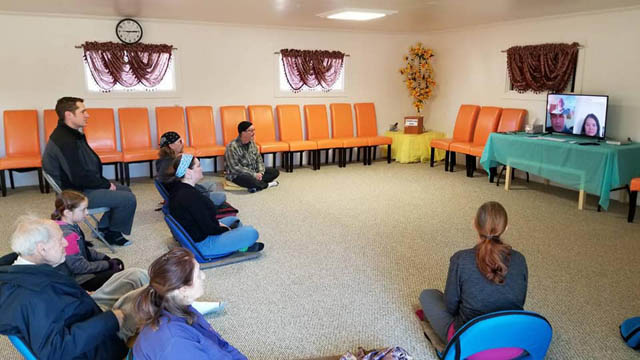
Students gather, virtually and in person, for a dhamma class.
Photos by: (Yee) Tanankarn Thanittithanand
I am unable to be in two places simultaneously, or three places. No matter how hard I try, I just can’t do it.
And yet I want to be able to work with my students in Denver, Colorado, and at three temples in Oregon. Practitioners want and need the mutual support of others, and their teacher’s guidance. But I just can’t travel continuously.
In the summer 2018 a family problem cropped up, requiring me to stay at home for several months to help out. I just couldn’t get away. I was frustrated on the one hand, but glad I could help the family on the other. Occasionally students would call to check in and ask questions, but for the most part, they did not.
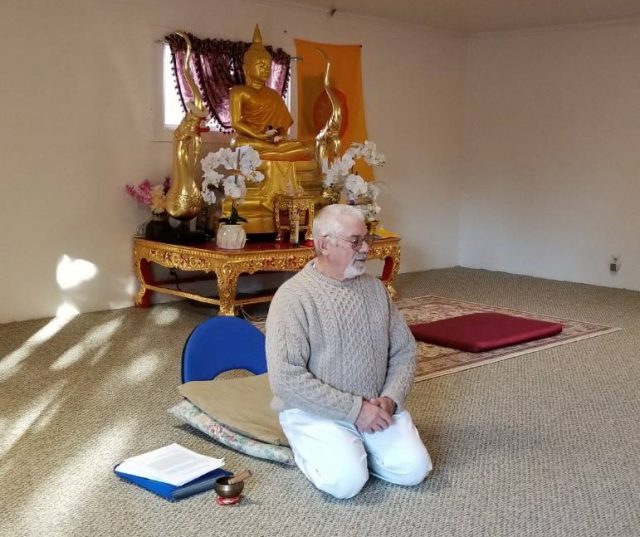
While I had continually asked students to make sure to reach out to me by phone, typically they did not. I needed to find some way to make myself more accessible to them.
In the meantime I was able to see how the Way of Compassion Dharma Center was handling remote teaching in my hometown of Carbondale, Colorado. This center had their teacher in India, and the students were scattered in various locations around Colorado.
There I witnessed the use of a more advanced meeting platform than I had seen used before. The picture image was as good as high-definition television, and the sound quality was ideal. These online meeting technologies were now developed and stable enough to get out of the way of the instruction and learning. This center’s equipment was certainly a cut above what I was using; they used a paid service to provide the online meeting platform.
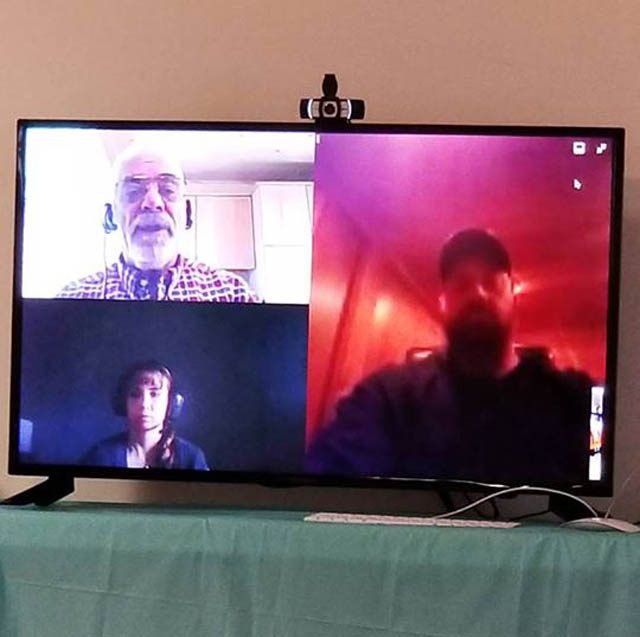
This was in stark contrast to my teaching attempts over Skype with several students in years past. The quality and reliability were just not there for any of us, and eventually I threw up my hands in frustration.
The need was still there, however, but the software just was not there for me at no or limited cost. But I do use Facebook, mostly for international and family communication, and it has always been quite reliable. After some looking around on the Facebook app called Messenger, I discovered that groups could easily be formed for video and speech using Messenger.
After a few tests we were able to proceed with practicing together, and communicated without a hitch. The platform was reliable and consistent, though of course dependent on the bandwidth available. (It has worked just fine even with relatively low broadband service.)
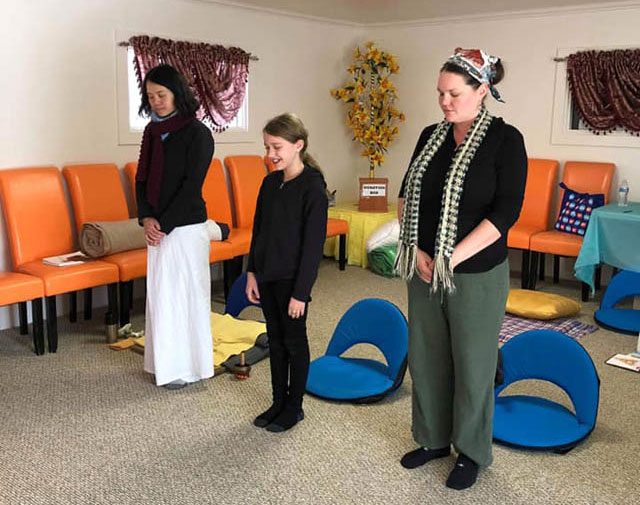
The online approach evolved gradually, developing from a group of students in Redmond, Oregon, which whom I had been meeting regularly since October, 2018. I started meeting regularly every other week with them in person, for vipassana practice and some dhamma instruction. Every time we met, a few new students joined us.
I was able to introduce new students to the technique taught by the late Burmese teacher Mahasi Sayadaw, and to allow more experienced to practice on their own. Then we would all come together for approximately 45 minutes of group practice, a short dhamma talk and metta, and conclude the time together.
Depending on how I saw their needs, I would ask some people to stay behind so I could answer questions or check with them about their practice.
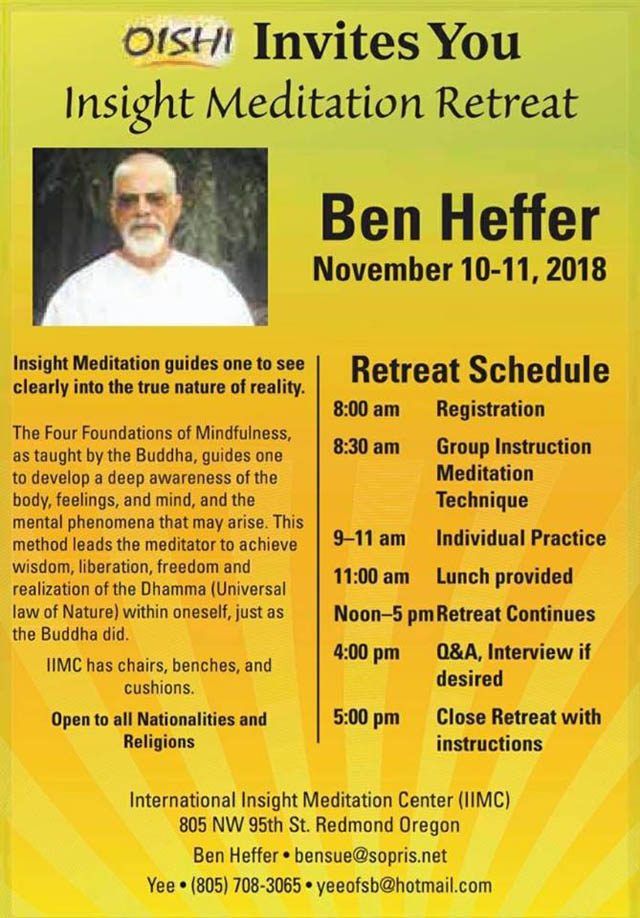
It was at this time that I realized I could broaden these sessions to other students, by using online technology to include people from the other locations where I teach. We tried Messenger, and found it worked flawlessly with a few exceptions.
If students did not use headsets, echoes became a nuisance. Bandwidth variations occasionally caused problems, but for the most part Messenger worked well. The varying screen displays of students, from large to small, adapted just fine.
There are still a few more technical problems to work out, but these issues can only be resolved with a significant increase in equipment costs. Not knowing how long this group will last, I chose not to invest in hardware for myself or for the hosting center in Redmond. Their initial start-up cost was $1,000, which bought a computer, large monitor, external camera and microphone and network extender. Picture and sound quality could further be improved by using upgraded equipment at all locations.
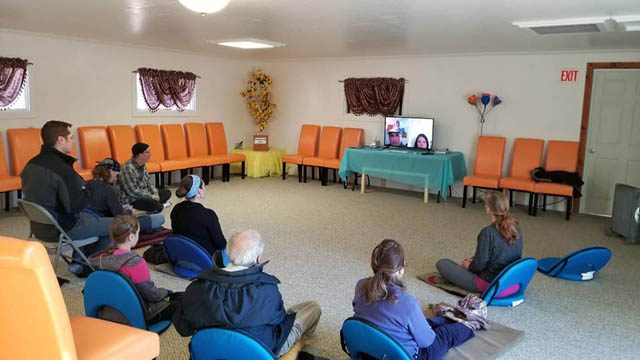
I was able to build a permanent invitation list on Messenger, and to use that to notify students of upcoming practice times. I’ve been able to use the texting tool for some dhamma instruction as well.
From my end I must at this time use Google Chrome, as it is the only platform that allows me to form a group on Messenger. On the users’ side any browser on any computer, cell phone or tablet works, as long as Messenger is loaded.
With the help of these technologies I am now back to teaching and supporting students and being generally more available, even when life prevents me from traveling. In addition, I am able to be part of a practice time that supports the needs of brand-new students.
As a teacher I’ve always needed to have eye-to-eye contact with students, for it to work for me, and for them. I now have that, and I can be in more than one place at a time and continue to serve the dhamma.
Despite the benefits, there are a few limitations. Some students do not benefit from learning and practicing this way, and some students do not wish to use Facebook and Messenger. Also there are some folks who do not have good Wi-Fi connections, making it a struggle for them to join.
Ben Heffer has been practicing meditation for almost 30 years, and has focused his practice with the guidance of vipassana teacher Ajahn Chalee Phumiphak for most of those years. Heffer teaches in various locations in Colorado and Oregon, and is now exploring using Facebook Messenger for teaching in various locations. Heffer plans and executes several retreats annually at Wat Buddhawararam in Denver, Colorado; at International Insight Meditation Center, in Redmond, Oregon; at LP Chalee Hermitage, in Albany, Oregon; and Wat Buddha Oregon, in Turner, Oregon.
Heffer lives in Western Colorado and is 73 years old. He teaches the Thai style of the Mahasi tradition to his students. Contact him at bensue@sopris.net, 970-456-3873.
